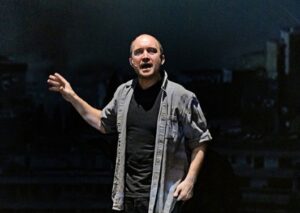
Theatre director Claire O’Reilly told David Hennessy about her current show that ponders the issue of nuclear disarmament and the threat that such weapons even existing poses to us all.
If nuclear weapons continue to exist, we won’t.
That’s the message behind Talking About the Fire which is currently playing at Royal Court Theatre.
Written and performed by Chris Thorpe, Talking About the Fire invites the audience to think about the issue.
Although the threat of nuclear war sometimes becomes more visible or pressing- like when Russia invades Ukraine, something like that doesn’t make the weapons more dangerous. They’re always dangerous. And one day – deliberately or accidentally – they’ll be used again. And then it’s all over.
Talking About the Fire comes From the team that created the award-winning Status and Confirmation, and the current run is the world premiere of a show about a new nuclear weapons treaty – one that’s trying to give the power to eliminate nuclear weapons to the states, and people, who don’t possess them.
Created by seven-time Fringe First winner Chris Thorpe and the Dublin director Claire O’Reilly and developed with Tony Award-winning Rachel Chavkin.
Based between London and Dublin, Claire is the director of the award-winning, internationally touring, new work collective Malaprop Theatre.
Recent projects include Hothouse (Malaprop, Dublin Fringe 2023, winner of Best Production at Dublin Fringe Awards), This Solution by Shaun Dunne (Dublin Theatre Festival 2023), Bulrusher by Eisa Davis (The Lir Academy 2023), A Family Business by Chris Thorpe (Staatstheater Mainz 2022), Accents by Emmet Kirwan (Dublin Fringe 2022), Christine by Jennifer Jonson (Peacock Theatre Dublin 2022), Where Sat the Lovers by Carys Coburn (Dublin Fringe 2021).
Claire’s associate director credits include A Streetcar Named Desire (Phoenix Theatre 2023), Dr. Semmelweis (Harold Pinter Theatre 2023).
Assistant director credits include Uncle Vanya (Sonia Friedman Productions 2020) and Translations (National Theatre 2019).
Claire is also a former Resident Director at the Abbey Theatre in Dublin (2022-2023) and has a Master’s in Drama Directing from the Bristol Old Vic Theatre School (2019) and is a graduate of Film and Theatre at Trinity College Dublin (2015).
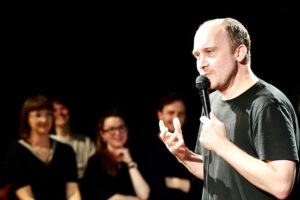
Claire told The Irish World: “The play is about nuclear disarmament and the process of treaty negotiation.
“Chris Thorpe, the writer/ performer, met a woman called Véronique Christory who happened to be the head of nuclear disarmament policy for the International Committee of the Red Cross.
“They just happened upon each other.
“Veronique came to see a show of Chris’, they got talking and became friends.
“And Veronique became a source of great intrigue for Chris. She had just been part of a group that established a new treaty which is called the Treaty for the Prohibition of Nuclear Weapons which is essentially a treaty that tries to make nuclear weapons illegal across the world.
“So he’s just been following that journey. He’s been going to meetings of States Parties, he’s been meeting diplomats, he’s been just learning loads.
“So basically, the show is about exploring those ideas, exploring the process of treaty negotiation, but it’s through the form of a conversation with the audience.
“He’s constantly interacting and building a relationship with the people in the room and just facilitating a conversation about these topics.
“It’s about trying to get people to think about and talk about nuclear weapons, because we don’t and they’re a huge threat to every single person on the planet.
“It’s been fascinating to learn about it.
“I think one of the interesting things about this topic is that we all know about them and they loom large in the consciousness. Weapons of mass destruction is an idea that we all understand but actually when you get to the bones of it, we don’t know very much of the fundamental details, and that’s what this show tries to do.
“It’s trying to just inform and to start looking at those ideas in a more conversational way.
“It is very grounded in research and relationships Chris has made with people working at very high level in this world.
“It’s actually all very grounded in the real world and in actually quite close contact with people for whom this is an everyday conversation.”
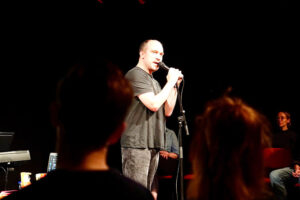
Chris is from the UK, Rachel is from America and you are, of course, from Ireland. Do you come to it with different perspectives? “Absolutely.
“It’s interesting, Ireland was one of the first countries to sign the Treaty of the Prohibition of Nuclear Weapons- and remains still one of the only European countries that have signed, there’s only a few, a handful- And was in the first 50 signatories, so learning about diplomacy and about how different countries can make decisions and make progress on ‘less popular’ ideas on a global stage has been really fascinating.
“And then just kind of details about how many there are, who actually has them, what nations don’t have them, but have other countries’ weapons stationed on their land, just all of these ideas that actually feel quite foreign as thoughts but when you break it down, are pretty straightforward.
“I definitely think there’s different levels of pride and shame.
“The UK, as Chris points out in the show, is one of the only countries that both makes its own weapons and stations the weapons of another country i.e. the US on its land.
“And on the flip side, Ireland is not squeaky clean by any stretch across a whole host of geopolitical issues but it was one of the first countries to sign the TPNW.
“So we actually all have very different views on the kind of fundamentals of why they shouldn’t exist and what makes them immoral, as well as illegal but I suppose we have different perspectives in a way because we’re from different places.”
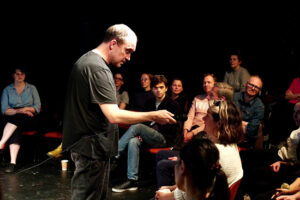
It’s mad to hear disarmament spoken about as an ‘unpopular idea’, but there is that reluctance there..
“Actually as of this week, 99 countries have signed the TPNW so that’s over half the countries in the world.
“The overwhelming majority of countries are interested in exploring this.
“That’s only the people who have absolutely signed, there’s still a whole host of people who are interested, but are trepidatious because of relationships that they have politically with other countries.
“It is actually becoming a majority opinion that to remove nuclear weapons from the world- And that’s what this treaty is about, it’s about trying to gain progress and momentum among countries who are not nuclear states because so far, the narrative has been controlled by nuclear states.
“This is the countries who don’t have weapons, who never want weapons and are saying no one on earth should have weapons either.”
The current runs is Claire’s first time to work at the Royal Court.
She develops her work with her Malaprop Theatre company and makes most of her work in Ireland.
“I’m between the two cities but I moved here initially to work on sort of larger scale projects as an associate director, to sort of learn the ropes of bigger West End kind of productions.
“I’ve been going back to Dublin to do most of my solo directing and now I’m starting to solo direct here.”
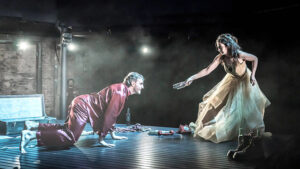
You certainly have worked on bigger productions being part of Paul Mescal’s A Streetcar named Desire, Translations at the National, Uncle Vanya starring Ciaran Hinds and Dr Semmelweis also in the West End this year.
“I hugely enjoyed them. I’ve been really lucky to have the experiences that I’ve had and also the just in a lot of different contexts, you know?
“Yeah, it’s actually nice to talk about them again because they feel like a while ago now, but I do enjoy associate work and it’s really interesting to see how other directors work and how things operate on a sort of bigger scale. Only good things.”
Let’s talk about them some more then. What was it like to be involved in A Streetcar Named Desire which earned Paul Mescal such acclaim?
“It was a wonderful company.
“I just came on for the transfer to the West End so by the time I came on, the show had already sold out, they’d already been nominated for a load of Oliviers so I can’t really claim much of a hand in the success in that sense, but it did mean that I came on and everyone was very secure, just pleased with the work and it was just a gorgeous team to experience that with.”
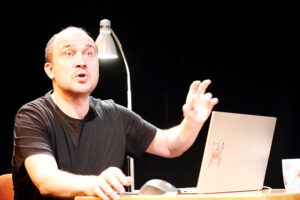
You also worked on Dr Semmelweis with a cast that included Mark Rylance and Mrs Doyle herself Pauline McLynn..
“Oh God, yeah. There’s always been a great Irish person in all of my English work, that’s funny. That’s probably why I’m on them.
“It was gorgeous and a lovely thing about that company too is that there was an ensemble of I think ten, maybe slightly less dancers representing the young women who died in childbirth in Vienna in the 19th century and watching Antonia Franceschi the choreographer work, that level of skill, across ballet and contemporary all woven in with the drama, that was a hugely enjoyable and a big learning curve for me.
“Each project always has a new thing or facet or idea that is really fun to watch develop.”
What was it like to work on Uncle Vanya, Conor McPherson’s adaptation of the Russian classic?
“It was great. I loved working on it.
“It’s always lovely to work with other Irish people and it’s fun with someone like Conor McPherson. He wrote The Weir. I was resident director with The Abbey last year and I popped in on their rehearsals when they were doing The Weir, and then Conor was around for that.
“It’s really nice when the same people are cropping up again in different cities. It’s nice to build that network.”
A production I caught myself was Translations at the National, was that special?
“It really was, for loads of reasons.
“I moved to London for that gig and it’s not often you get to work at the flippin’ National Theatre in London.
“It kind of just fell on my lap.
“I love that play. I think it’s a beautiful play but also my background has kind of been devising experimental contemporary work, so I rarely get to engage with classics.
“Ian Rickson is so thorough and he was just the perfect mentor for me because he has a really different discipline and process and I learned so much from him.
“And yeah, it was all these amazing Irish performers on the main stage in the National Theatre so it did feel really special.”
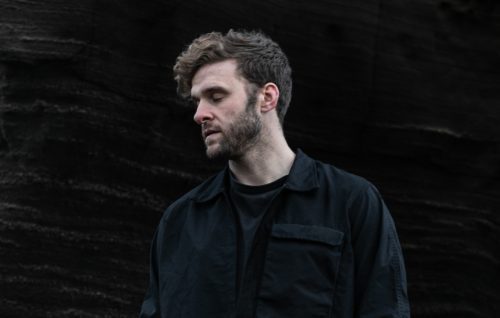
We also interviewed Eoin French, the Cork musician also know as TALOS, who told us about Accents the play that also starred Emmet Kirwan.
The Irish Times said of it: “Claire O’Reilly finds vigorous theatricality… Reaches moments of astonishing beauty.”
It sounded like a really interesting piece about accents and what they represent and what goes with them..
“It was beautiful.
“Emmet and Eoin are just artists at the top of their game.
“Emmett has such a unique perspective on Ireland but Dublin specifically.
“He’s a poet, but he’s also political and he’s very funny.
“He’s a very dexterous performer, very capable, very sincere but also can be very light.
“He was just a joy to work with and a joy to kind of see the city through his eyes and how the city has developed through his family.”
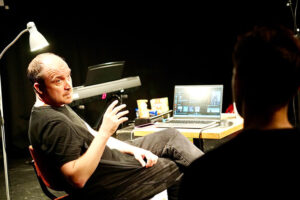
Back to Talking About The Fire, it sounds like it could be various different directions whether it be the more political or more human aspects of it, am I right?
“You are, I think it is about thinking about the humanity in these ostensibly, high level complicated and distant rooms.
“Chris is able to make these kind of hypothetical or scary concepts feel real, but also manageable and break it down into something as simple and as natural and as connective as a conversation.
“I’m not saying that we solve anything necessarily in the show, but it does give some tools and some hope as to how to process some of these ideas.
“We’ve talked a lot about scale.
“The enormity and severity of what these weapons are capable of is very hard to imagine.
“We’ve talked a lot about that and about ways of actually even accessing what that destruction would look like, or the kind of impact that it would have.
“We’ve also talked about the stakes.
“Obviously, everybody knows about Hiroshima and Nagasaki but also there’s huge areas where bombs were tested, lands were levelled for airfields and there were islands depopulated so that bombs could be tested on them so the human cost is actually much bigger than the average person thinks.
“And also, the possibility and inevitability of these weapons. being used in some way is actually very high.
“It’s a lot higher than we think, because of rising tensions between countries or because of climate change causing infrastructure to be unstable, or just mistakes, human error.
“It’s not deliberately trying to terrify but it is trying to make these sort of nebulous concepts feel a little bit more real because the stakes are very high.
“One of the points the show makes is that different conflicts around the world make nuclear weapons or the possibility of the use of nuclear weapons rise in our consciousness and make us think about them a bit more but actually, one of the ideas we explore is that whether we’re in crisis or not and often we are- Globally, somewhere, someone’s in crisis- The possibility of these weapons is actually in an everyday context, higher than we think.
“And as long as they exist, we run the risk of their use.
“And so it’s, I think, quite an urgent, global idea to really normalise the thought that they should not exist.
“We’ve somehow made them normal and accepted the fact that they exist on Earth and that should not be the case.
“We should normalise the fact that they’re not normal.”
It all sounds very bleak but the show is lighter than that, isn’t it?
“It is really fun, and Chris is a great conversationalist.
“And he’s also a very fun person.
“There’s absolutely more playful and theatrical aspects to it.
“He’s not interested in terrifying anybody to the point of paralysis so even though there is fear- Yes, fear is a necessary component to this conversation because the stakes are so high- It is about, as you said earlier, the humanity and the human capacity to make change and conceptualize a different world for ourselves.
“So there is hope.
“And there’s a lot of fun
“There are more playful elements, for sure.”
Do you even find some comedy in such a serious issue? “You know what’s funny? I think audiences are so surprising and can be so funny especially when it’s well facilitated.
“We’ve all been in shows where audience interaction is very painful but I think when it’s well facilitated, and Chris is a great facilitator of conversation, there’s lots of warmth and humour and playfulness and risk that comes with that.
“I don’t want to go out and say it’s a comedy because it isn’t but there’s definitely some lighter moments.”
What has the reaction been to the show from Véronique Christory?
“She is amazing.
“I think a big part of her thought process or agenda is to get the ordinary people talking about this.
“I think she sees the show as an opportunity to do that.
“She’s been amazing.”
And you will be happy if you just get people talking about the issue? “Absolutely.”
Talking About the Fire is at the Royal Court Theare until Saturday 16 December.
For more information, click here.


